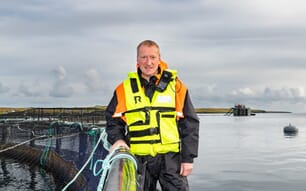The recent MSC accreditation of the Shetland Island's king scallop dredge fishery demonstrates that given sufficient scientific evidence to inform appropriate management this can be achieved. The PhD is funded by members of the UK Scallop Association and the Fishmongers Company.
There are three main principles covered by the MSC criteria for sustainability. The first requires that fishing effort is occurring at a level that is sustainable for the stock. Distinct stocks (those between which larvae do not mix or 'inter-breed' due to diverging ocean currents) need to be identified so individual 'stocks' can be assessed. PhD student Claire Szostek will identify these by genetic analysis of scallop tissue samples from various sites across the English Channel. She said: "I have been liaising with fishermen and processors who have collected samples for me in specific areas. With their help I now have samples for seven sites and hope to obtain a further five." This information can then be linked to the stock assessment currently being undertaken by Cefas (known as the Red Bag scheme), which will provide the first estimates of scallop stocks around England and Wales.
Another important aspect is to quantify bycatch of the fishery. Although scallop fishing is considered relatively 'clean' compared to some other mobile gears, for the MSC assessment this must be quantified and Claire has spent a number of days at sea this year on commercial scallop vessels, sampling bycatch. She will continue this work throughout the winter and next spring, following the fleet as they move between fishing grounds.
The second MSC principle stipulates that sensitive habitats should be protected. An extensive habitat survey of the English Channel is planned for summer 2013 on the Bangor University research vessel the RV Prince Madog. This research cruise has been made possible by additional funding from the retailer Morrisons.
Using complex ecological modelling techniques, the habitat data collected can be related to fishing intensity, which will be estimated from VMS (Vessel Monitoring System) data and vessel statistics). This will help to identify which areas are more or less sensitive to fishing. Spatial variations in fishing intensity and indications of the productivity of different areas (estimated from VMS linked with landings data) will also help to inform effective spatial management, covered in the third MSC principle. A number of vessel owners in the over 15 m fleet have permitted the use of VMS and logbook data to be analysed for the research.
Claire has also been conducting face-to-face interviews with skippers of the under-15 metre fleet to ascertain which inshore locations constitute the fishery and to estimate fishing intensity in inshore locations on a broad scale.
Claire said: "Up until next summer I will be focused on gathering all available habitat and fishing data and sampling at sea with the scallop fleet. I have sampled a number of sites in the inshore western Channel this summer and my next target areas are the eastern Channel and the Channel Islands. Once I have completed sampling, the task of analysing all the data will begin. For this I am fortunate to have support from the Fisheries & Conservation research team at Bangor and I'm very grateful for the assistance I have received so far from the project sponsors, vessel owners, skippers and crew, which has been invaluable."
Channel Scallop Fishery Taking Steps Toward Sustainable Accreditation
UK - A three year PhD project currently underway at Bangor University is focused on filling critical knowledge gaps for the English Channel king scallop fishery that will be used to inform future sustainable management and prepare the English Channel fishery for Marine Stewardship Council (MSC) accreditation.
by Banrie



